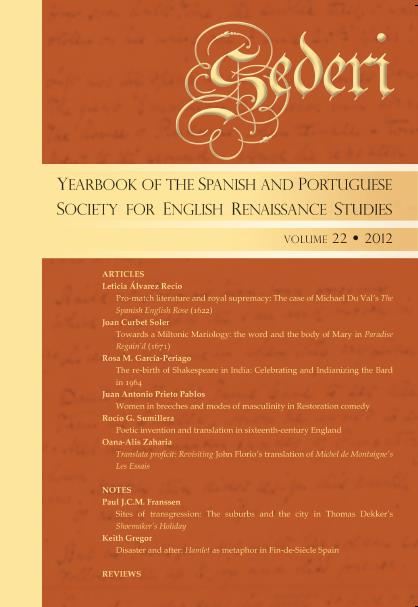Towards a Miltonic Mariology: the word and the body of Mary in Paradise Regain’d (1671)
Keywords:
Gender, motherhood, selfhood, epicAbstract
It is a recurring critical topos that John Milton’s Paradise Regain’d (1671) is a revisionist poem, one that works towards reframing and redefining the epic tradition; what has certainly been less noticed is the central function played by the character of Mary, the mother of Christ, in this revisionist process. This article will try to prove that Mary’s appearances in the poem are, though limited, essential to its content and to its perspective on the interrelated subjects of the revelation of God in history and the individual confrontation with historical forces; and it will try to do so by bringing together theological discussion and a gender-oriented approach.
There have certainly been approaches to Paradise Regain’d that have explored some of the gender issues brought about by the poem’s modification of the heroic function: almost unanimously, these approaches have concentrated on the character of the Son. My intention here, however, is another: I will try to show how the function and voice of Mary in the poem set in motion a complex, rich network of implications
Downloads
Downloads
Published
Issue
Section
License
The copyright holder of the published contributions is SEDERI.The hardcopy and an open-access version of the journal will be published simultaneously. The issues will be available online in the SEDERI website (http://www.sederi.org/yearbook/) and other repositories that have signed an agreement with SEDERI.
The authors who publish with this journal agree to the following terms:
a) SEDERI retains copyright of the essay.
b) If the author wishes to republish or rewrite the essay for another journal, or include the essay published in SEDERI in their personal repositories, or in any other way, they should contact the editors to obtain permission to do so. This will entail citing SEDERI as the original source and sending the editors a copy of the new version, or the link to the website, in case of online publishing.
The author(s) hereby warrant(s) that:
a) The essay submitted for publication is an original creation and does not infringe any copyright or property right of another journal, author or publisher.
b) The essay submitted for publication has not been previously published, whole or in part, and is not being considered for publication elsewhere.
c) Written permission has been obtained for any material from other sources included in the essay submitted for publication.




